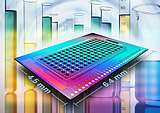Developers of Electrical Biochip Technology Nominated for German Technology and Innovation Award - Fraunhofer ISIT, Siemens and Infineon Plan Further Collaboration on Biochip Technology
"We are pleased to have been nominated for this award and are proud and grateful that our development on electrical biochip technology has received such recognition," said Dr. Rainer Hintsche of the Fraunhofer Institute for Silicon Technology and spokesperson for the "Lab-on-a-Chip - electrical biochip technology" project, which today was nominated for the "Deutscher Zukunftspreis", Germany's prestigious Future Award for Innovation and Technology instigated by the President of the Federal Republic of Germany.
While a great honor for Dr. Hintsche and his partners Dr. Roland Thewes from Infineon Technologies and Dr. Walter Gumbrecht from Siemens, the nomination is no reason for them to rest on their laurels from now on. On the contrary, the three partners from research and major industry aim to pursue their successful collaboration on electronic biochip technology. Following the joint development of the world’s first fully electronic DNA biochip, which enables, for example, various carcinogenic viruses to be detected, the three partners plan to continue their scientific exchange in joint projects. The cooperation venture has been running successfully for many years and was initiated by the “SIBANAT” project sponsored by the German Federal Ministry of Education and Research (Bundesministerium für Bildung und Forschung, BMBF).
The jointly developed basic technology of the electronic biochips, including the associated microfluidic components on the chip, opens the way to a host of potential applications. This will enable all three partners to implement their own particular solutions in line with their different corporate strategies. The planned future collaboration is aimed at broadening the basic technology in terms of the different areas of application.
Siemens, for example, wants to implement an entire “laboratory on a chip” in a smart card similar to conventional check cards. The aim is to manufacture the solution, called the “quicklab® system”, at low cost as a general-purpose, mass-market analytical product on the basis of already existing production technologies for smart cards. The development is intended to be used in doctors’ surgeries, at the point of care and in clinical laboratories, with the smart card being inserted into a laptop-sized terminal which controls the analysis process fully automatically and provides a readout of the results.
Infineon is working on incorporating the electronic DNA biochips in very powerful desktop devices for diagnostics applications. This will enable complex DNA analyses to be carried out in medical practices, hospitals and other medical institutions faster and more cost-effectively than in the past.
Working together with the company eBiochip Systems GmbH, a spin-off from the institute founded specifically for this purpose, the Fraunhofer ISIT is expanding this platform for biochemical measurement technology with low-density electrical biochips and low-cost portable devices for specialized measurements. Typical applications for these devices will include monitoring of foodstuffs for harmful substances or identification of pathogens in the human environment.
























